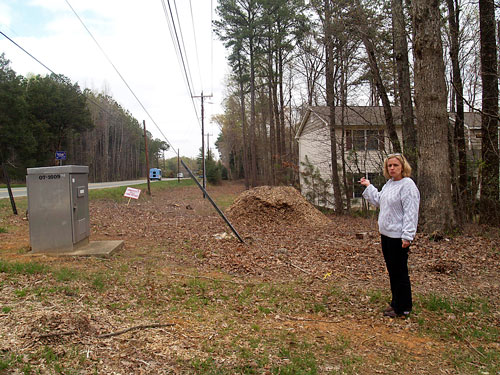
By Susan Dickson
Staff Writer
On Dec. 10, Kimberly Willardson moved her family from a Carrboro condominium to their new home on the corner of Seawell School and Homestead roads in Chapel Hill. Eighteen days later, she awoke to the sound of chainsaws and looked outside to find men cutting down trees in her yard.
Prior to the move, Willardson had researched the planned developments across the street and new stoplights down the road. She’d contacted the Chapel Hill Planning Department and spent months considering the property. But she hadn’t anticipated the drastic changes that were about to occur on that property.
Duke Energy cut down trees, saplings and underbrush, including nearly everything shielding Willardson’s home from Homestead Road, in order to maintain the right-of-way underneath their power lines.
Willardson hadn’t seen a brochure explaining the cutting that was delivered to her teenage son a week and a half earlier, so she was surprised to see the crew of men in her yard at 8 in the morning.
“Nobody’s going to argue with the right-of-way,†Willardson said. “It’s the way they did it.â€
That same day, Willardson filed a complaint with Duke Energy and was told someone would respond. She has not yet heard back.
“In the meantime, the trees are down,†she said. “I can’t get any answers.â€
Betsy Conway, a spokeswoman for Duke Energy, said the company is required to maintain rights-of-way as a regulated public utility. The work along Homestead Road is part of the company’s routine maintenance program.
“That helps ensure safe, reliable electric service to folks,†she said. “We certainly welcome the opportunity to talk with our customers at any time should they have concerns, and we will go out and speak with people.â€
Conway said the company identifies trees that are interfering with power lines, as well as branches coming into the right-of-way. Saplings of fast-growing trees, like pine, maple and oak, are also cut, she said.
“We take a targeted approach,†Conway said.
Once cutting and trimming is complete, workers leave trimmings and brush cuttings in non-landscaped areas. They do a general cleanup of landscaped areas, but leave behind cut wood from trees.
“The reason behind that … is designed to ensure reliability by managing costs to our customers,†Conway said. “The cost of managing the natural growth that occurs around the power lines, those costs are all part of the rates that are paid by our customers.â€
From Willardson’s yard, the crews continued their work down Homestead Road and into surrounding neighborhoods. Cherie Kuzmiak, a Stateside Drive resident, found crews removing trees around her home last week.
“Duke Energy pretty much just clear cut part of my front yard that I share with a neighbor,†Kuzmiak said.
Kuzmiak contacted a Duke Energy foreman, who told her he’d visit her property and no further cutting would be done until then. The next day, Kuzmiak returned home to find men again cutting trees in her yard. When she tried to get the crew to stop, they called the police.
“The bottom line is Duke just needs to be honest with people and not pass out some glossy brochure†that refers to a kinder, gentler cut, she said.
Kuzmiak plans to replant, though she expects it will cost thousands of dollars to remove the stumps and plant new trees.
“I would rather pay more from my monthly bill knowing that trees are going to be trimmed instead of hacked down,†Kuzmiak said.
Willardson estimates her property value has dropped about $20,000 due to the cutting. Since she knows Duke is unlikely to compensate her for that loss, she’s organizing a class-action lawsuit against the power company.
Conway said the company does not provide compensation for cutting and trimming in rights-of-way. She encouraged customers to plant trees, like those on the company’s website, duke-energy.com, that don’t grow above 20 feet.
Cutting will continue in Chapel Hill for several weeks, Conway said, adding that all impacted residents will receive notification. Based on feedback it has gotten, Duke Energy is working to improve the notification letters it distributes to residents.


Duke’s unsubtle, resident-hostile policy is a lot like prison dentistry. No matter what the problem, the solution is always the same: extraction.
As a matter of fact, “in” the right of way is defined as not only what grows, um, *in* the right-of-way, but anything that is or might in the future extend into it. They will force you to drastically cut back trees that are not in the right-of-way, or they will cut them down, if, in their sole, unchallengeable judgement, they might be an issue *someday*.
There is no appeal, there is no grievance process, there is no provision for public review, and, best of all, there is no compensation. Sounds like corporate tyranny to me.
Essentially, this practice, with police enforcement, is so skewed in favor of this corporation and away from the citizen to, for all intents and purposes, constitute illegal land appropriation.
When is the Board of Aldermen and the State Legislature going to step in and restore a proper balance?
The answer is obvious: never. The clinking of coins into the state coffers is the only thing our elected representatives listen to anymore.